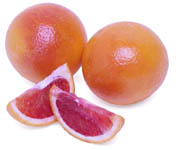

HOME
 COLUMNS
COLUMNS
E-MAIL
YOUSSUF
YOUSSUF
Friday, November 3, 2000
The Ruby Red Oranges
by Youssuf El-Kalay
Asalamu Aliakom Wa Rahmat Allahu Wa Barakatu.
Welcome back to Egyptian Tales. This week's story will be short but the lesson learned will be great Insha'Allah. I have noticed through my travels around the world that a major problem with many Muslims (including myself) is how we interact with our Muslim brothers and sisters. We seem to have a lack of forgiveness between ourselves. I hope that this story will shed some light on what I am trying to bring across Insha'Allah.
As I have mentioned in my previous story (The Streets of Old Cairo), Egypt is a mix of old and new. Many people still purchase their groceries in open air markets. To those of us who live in the West, it may seem awkward but it is a part of everyday life in Egypt. Often times a buyer will develop a rapport with the seller, and become a special customer. It's a lot different than walking into your local grocery store, purchasing some fruit and walking out. Usually it's the seller that picks out the produce for you. Unfortunately a lot of the fruit that is picked doesn't always stay in great condition, especially from the harshness of the summer heat. That's why if you have a good relationship with the seller, they'll pick out the best fruit for you. Though as you'll see in a bit, this isn't always the case.
It was late at night and I had spent the entire day with my grandfather at the university. We decided to stop by a local fruit grocer and purchase some fruit. It so happened that the owner of the fruit stand was away, and had left his son Ahmed, to attend to the customers. Ahmed was a young man: sixteen years old at most, judging from his appearance. We greeted him with "Asalamu Aliakom" and he replied "Wa Aliakom Asalam", while adjusting the fruit in their boxes. He showed us all the fruit he had, bananas, apples, and ruby red oranges in great quantities."Oh Hajj," he said, "I highly recommend these ruby red oranges, you won't find them anywhere in this size or price, they are the best in town."
Ruby red oranges are super sweet, loaded with even more natural sugars than a regular orange and just bursting with flavor. They are called ruby red oranges because the fruit is actually red in pigment.
After discussing what fruit we wanted, my grandfather decided to get a few kilos of apples, bananas and ruby red oranges. Ahmed was very happy and went on to say, "I will pick out the best oranges for you, Hajj". We paid for the fruit and headed on home. Boy, was I looking forward to tasting some of those amazing ruby red oranges!
When we got home, we took all the oranges and thoroughly washed them. I proceeded to cut open several of the oranges but to my surprise they were not ruby red at all. In fact, not only did they look like regular oranges but they tasted like them as well. I decided to cut open all the oranges since we were using most of them to make orange juice. So you're probably thinking only a couple turned out to be regular oranges, right? Wrong... of approximately 45 oranges I found only one that was semi ruby red. I was very disappointed and immediately complained to my grandfather. How could Ahmed have sold us these oranges making us believe that they were ruby red when they weren't? And of all things, recommending them to us as "the best in town". I told my grandfather that we should return to Ahmed and demand that he return our money and give us the proper oranges. I was furious.
My grandfather sat me down and said, "Calm down, is it worth arguing with your Muslim brother about some oranges?"
I thought about it for a second or two and said, "But he has stolen from us, he gave us regular oranges instead of ruby red ones!"
"How do you know he did this deliberately?" my grandfather replied. "Isn't it possible that whoever shipped him the oranges told him they were ruby red when they weren't?"
I said, "But that's no excuse …"
My grandfather sighed and said, "Then forgive him! Let it pass. Everybody, even you often make mistakes…"
So yes, I went to sleep that night a little disappointed about the lack of ruby redness in the oranges we had purchased, but looking back I see how important it is that we forgive one another. You might remember a hadith of the Prophet Muhammad (peace and blessings of Allah upon him) in which he said that we should forgive our Muslim brothers and sisters and give them 70 excuses. And that if we can name 70 excuses there is at least 1, which we cannot name.
Until next time, Insha'Allah...
Youssuf El-Kalay has lived in Scotland, Egypt, Bahrain, and the United States, and currently resides in Southern California. It is his hope that through his stories, you the reader will be able to experience some of his adventures and the lessons he has learned from them.
If you enjoy these stories, let us know. Your feedback is important and is always appreciated.

